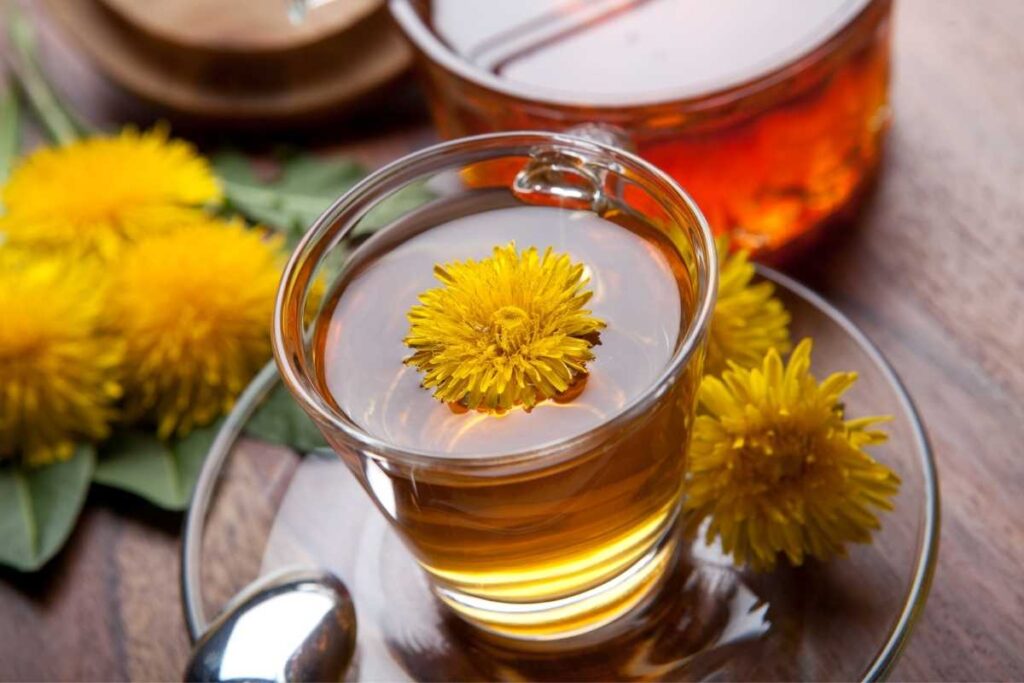Dandelion Tea Benefits: 7 Surprising Ways to Improve Your Health

Looking for a natural way to improve your digestion and liver function? Look no further than dandelion tea! Made from the roots, leaves, and flowers of the dandelion plant, this herbal brew has been used for centuries to promote health and wellness. Dandelions are known for their detoxification process, making them an excellent choice for those looking to cleanse their body. This tea is rich in nutrients that support the liver and aid in digestion. So if you’re looking to add more plants to your diet, consider adding dandelion tea to your daily routine. Grab a cup of warm dandelion root tea and let’s get started!
Nutritional value of dandelion tea
Dandelion tea, made from the plant taraxacum officinale, is packed with essential nutrients and antioxidants that offer numerous health benefits. Dandelions are powerful plants that provide a range of nutritional values in the tea.
High in Vitamin K
One cup of dandelion tea, made from the leaves of the dandelions plant, provides 535% of the daily value of vitamin K, which plays a vital role in blood clotting and bone health. Dandelion greens are rich in antioxidants, which help fight against free radicals that can cause damage to our cells. These plants also help prevent osteoporosis by improving calcium absorption and reducing urinary excretion.
Good Source of Calcium
Dandelion tea, made from the plant’s greens, contains 19% of the daily value of calcium and is a great source of vitamin D. Drinking dandelion tea regularly can help prevent bone loss and fractures, especially in postmenopausal women.
Rich in Iron
Dandelions are nutrient-rich plants that can be brewed into a tasty tea. This vitamin-packed brew provides 10% of the daily value of iron per cup, making it an excellent option for individuals who struggle with iron deficiency.
Apart from these three key nutrients, dandelion tea also contains other essential vitamins and minerals like vitamin A, vitamin C, folate, magnesium, and potassium. Dandelions are the plants used to brew this tea, and it is made by steeping the roots of the plant. It is also low in calories, making it an ideal drink for weight management.
How much caffeine does dandelion tea contain?
Unlike traditional teas like green or black tea, dandelion tea is made from the roots of dandelion plants. This caffeine-free tea is rich in vitamins and you can enjoy its refreshing taste without worrying about caffeine jitters or sleep disturbances.
What does dandelion tea taste like?
Dandelion tea, made from the roots of the dandelion plant, has a slightly bitter taste similar to coffee but with a more earthy flavor profile. Some people describe it as having a nutty or roasted flavor that pairs well with honey or lemon. Additionally, dandelions are a great source of vitamins and minerals.
How much dandelion tea can I drink?
While there’s no specific limit on how much dandelion tea you can drink, it’s best to consume it in moderation. Dandelions are a nutritious plant that contain vitamins and minerals, especially in their roots. Drinking too much may cause stomach upset or interact with certain medications. It’s always best to consult your doctor before adding any new beverage, especially one made from dandelions, to your diet.
How much dandelion tea for water retention?
Dandelion tea, made from the roots of the dandelion plant, is a natural diuretic that can help reduce water retention and bloating. Dandelions are rich in vitamins and minerals, making dandelion tea a healthy choice. While there’s no set dosage, drinking 1-2 cups of dandelion tea per day may help alleviate symptoms of water retention. However, if you have an underlying medical condition or are taking medication, it’s best to consult your doctor before using dandelion tea as a remedy.
How to Make Dandelion Tea
Dandelion tea made from the roots of dandelions is a delicious and healthy beverage that is rich in vitamin content. It can be easily made at home. Here’s how you can make it:
Boil Water in a Pot or Kettle
The first step is to boil water in a pot or kettle. You will need approximately 8-10 ounces of water for one cup of tea. Bring the water to a rolling boil and add dandelion roots, petals, or greens from the dandelion plant to make a flavorful and healthy tea.
Rinse and Chop Fresh Dandelion Leaves or Use Dried Leaves
Next, rinse fresh dandelion leaves and roots thoroughly under cold running water to remove any dirt or debris. If you are using dried dandelions et al, skip this step.
Chop the fresh dandelion greens, petals, and roots of the dandelion plant into small pieces with a sharp knife. This will help release the flavor and nutrients during steeping.
Place the Leaves in a Tea Infuser or Directly in the Boiling Water
Place the chopped dandelion leaves and petals in a tea infuser or directly into the boiling water. If using an infuser, make sure it is large enough to allow the dandelion plant to expand during steeping. Don’t forget to also try brewing tea with dandelion roots for a unique flavor.
If you don’t have an infuser, you can use a fine mesh strainer to strain out the dandelion petals, dandelion roots, et al after steeping.
Steep for 5-10 Minutes, Strain and Serve Hot or Cold
Allow the tea, with added dandelion roots, to steep for 5-10 minutes, depending on your taste preference. The longer you steep it, the stronger and more bitter it may become.
After steeping, strain out the leaves using an infuser or strainer et al. Pour your freshly brewed dandelion tea into your favorite mug and enjoy!
You can serve dandelion tea hot or cold depending on your mood and preferences. Add honey or lemon for added sweetness if desired.
Dandelion tea variations and optional sweeteners
Dandelion tea is a popular herbal beverage that is known for its numerous health benefits. But did you know that there are different variations of dandelion tea, and you can also add sweeteners to enhance its taste? In this section, we will explore the different types of dandelion tea and optional sweeteners that you can use.
Dandelion coffee as an alternative to dandelion tea
If you’re looking for a caffeine-free alternative to coffee, then dandelion coffee might be just what you need. Made from roasted dandelion roots, this beverage has a rich, nutty flavor that is similar to coffee. It’s also loaded with antioxidants and has anti-inflammatory properties.
To make dandelion coffee, simply roast the roots in the oven until they turn brown and crispy, et al. Then grind them into a fine powder using a blender or food processor, et al. Brew the powder in boiling water just like regular coffee, et al.
Using sugar as a sweetener for dandelion tea
If you prefer your tea on the sweeter side, then adding sugar is one option. However, it’s important to note that consuming too much sugar can have negative effects on your health. Instead of using refined white sugar, try natural alternatives like honey or maple syrup.
Alternatively, you can use stevia or monk fruit extract as zero-calorie sweeteners. These options are especially useful if you’re watching your calorie intake or have diabetes.
Alternative sweeteners for dandelion tea
Apart from sugar-based sweeteners, there are other options available as well. For instance, cinnamon adds warmth and sweetness without any added calories. You can also try adding vanilla extract or almond milk for a creamy texture and subtle sweetness.
Another unique option is licorice root powder which has natural sweetness but also provides additional health benefits such as soothing digestive issues and reducing inflammation.
Boiling water and dandelion tea preparation
When preparing dandelion tea, it’s important to use boiling water to extract the maximum amount of nutrients from the plant. Simply boil water in a kettle or on the stove and pour it over the dried dandelion leaves or flowers.
Let it steep for 5-10 minutes before straining out any remaining pieces. You can also add lemon juice or ginger for an extra flavor boost.
Dandelion tea pieces and their effect on taste
Dandelion tea is available in different forms such as loose leaf, teabags, or even dried flowers. The form you choose will impact the flavor of your tea. Loose leaf teas tend to be more flavorful but require a strainer while teabags are convenient but may lack depth in taste.
Using dried flowers will provide a subtle floral aroma and taste while using leaves alone will have a slightly bitter flavor profile. Experiment with different forms to find your preferred taste profile.
Polysaccharides in dandelion tea and their health benefits
Dandelion tea contains polysaccharides which are complex carbohydrates that help improve digestion, boost immunity, and reduce inflammation.
Blood Sugar Stabilization and Weight Loss Benefits of Dandelion Tea
If you’re looking for a natural way to stabilize your blood sugar levels and lose weight, dandelion tea might be just what you need. Here are some key benefits of incorporating this herbal tea into your diet:
Helps Stabilize Blood Sugar Levels
Dandelion tea has been shown to have a positive effect on blood sugar levels, making it an excellent addition to a diabetic diet. This is because the tea contains compounds that can help regulate insulin secretion and improve glucose tolerance.
When you consume dandelion tea regularly, it can help prevent sudden spikes in blood sugar levels that can lead to energy crashes and cravings for sugary foods. By keeping your blood sugar levels stable throughout the day, you’ll feel more energized and less likely to reach for unhealthy snacks.
Aids in Weight Loss
In addition to its blood sugar stabilizing properties, dandelion tea may also be beneficial for weight loss. The tea has been shown to reduce inflammation in the body, which can help promote healthy digestion and prevent bloating.
Drinking dandelion tea regularly can also help flush excess water weight from your body, leading to a slimmer appearance. Plus, the blood pressure-lowering effects of dandelion tea can contribute to a healthier weight overall and reduced risk of obesity.
How To Incorporate Dandelion Tea Into Your Diet
To reap the benefits of dandelion tea for blood sugar stabilization and weight loss, try drinking 1-2 cups per day. You can make your own by steeping fresh or dried dandelion leaves in hot water for 5-10 minutes.
Alternatively, you can find pre-made dandelion teas at health food stores or online retailers. Just be sure to choose organic varieties without any added sugars or artificial flavors.
Diuretic and Kidney Stone Prevention Benefits of Dandelion Tea
Dandelion tea is a natural diuretic that has been used for centuries as a natural remedy for various urinary tract problems. In this section, we will discuss the diuretic properties of dandelion tea and how it can help prevent kidney stones.
Natural Diuretic
Dandelion tea is a natural diuretic that helps increase urine production and flush out excess fluids from the body. This property makes it an effective remedy for urinary tract infections (UTIs) and other related conditions. By increasing urine output, dandelion tea helps to eliminate harmful bacteria from the urinary tract, reducing the risk of UTIs.
Diuretic Properties
The diuretic properties of dandelion tea are due to its high potassium content. Potassium is an essential mineral that regulates fluid balance in the body by promoting healthy kidney function. When your kidneys are functioning properly, they filter waste products from your blood and excrete them through urine. By promoting healthy kidney function, dandelion tea helps prevent fluid buildup in the body, which can lead to edema (swelling).
Urinary Tract Infections
UTIs are caused by bacterial infections in the urinary tract system, including the bladder, urethra, kidneys, and ureters. Symptoms include painful urination, frequent urination with small amounts of urine produced each time, cloudy or bloody urine, fever or chills.
Drinking dandelion tea regularly can help prevent UTIs by flushing out harmful bacteria from your system before they have a chance to cause an infection.
Kidney Stone Prevention
Kidney stones are hard deposits made up of minerals and salts that form inside your kidneys when there is too much buildup of these substances in your urine. They can be extremely painful to pass and may require medical intervention if they become lodged in your urinary tract.
Regular consumption of dandelion tea may help prevent the formation of kidney stones by promoting healthy kidney function and increasing urine output. By flushing out excess minerals and salts from your system, dandelion tea helps reduce the risk of kidney stone formation.
Safety
Dandelion tea is considered safe for most people to consume. However, if you have a history of kidney problems or are taking diuretic medications, it’s important to talk to your doctor before adding dandelion tea to your diet.
Liver Health Benefits and Cleansing Properties of Dandelion Tea
Dandelion tea, made from the roots and leaves of the dandelion plant, has been used for centuries as a natural remedy for various health conditions. One of its most notable benefits is its ability to support liver health by improving liver function and aiding in detoxification.
Dandelion Tea Improves Liver Function
The liver is responsible for filtering toxins and waste products from the blood. When it becomes overburdened with toxins, it can lead to various health problems. Dandelion tea contains compounds that have been shown to improve liver function by increasing bile production and reducing inflammation.
Studies have found that dandelion root extract can help protect against liver damage caused by alcohol consumption and exposure to toxic substances. It may also help prevent fatty liver disease, which is characterized by an accumulation of fat in the liver.
Dandelion Tea Enhances Detoxification Process
Detoxification is a natural process that occurs in the body to eliminate harmful substances. Dandelion tea can enhance this process by supporting liver function and promoting healthy digestion.
The diuretic properties of dandelion tea help flush out excess fluids and toxins from the body through urine. This can be especially beneficial for those with kidney or bladder problems.
Inflammatory Properties Prevent Cell Damage
Inflammation is a natural response of the immune system to injury or infection. However, chronic inflammation can lead to cell damage and contribute to various diseases such as cancer, diabetes, and heart disease.
Dandelion tea contains anti-inflammatory compounds that can help reduce inflammation throughout the body. This may help prevent cell damage and promote overall health.
Aids in Weight Loss by Inhibiting Pancreatic Lipase Activity
Pancreatic lipase is an enzyme responsible for breaking down fats in the digestive system. Inhibiting its activity can aid in weight loss by reducing the amount of fat absorbed by the body.
Dandelion tea has been shown to inhibit pancreatic lipase activity, making it a potential natural remedy for weight loss. However, more research is needed to determine its effectiveness in this area.
Positive Effect on Liver Enzymes
Liver enzymes are proteins produced by the liver that help break down and process substances in the body. High levels of liver enzymes can indicate liver damage or disease.
Studies have found that dandelion root extract can help reduce elevated levels of liver enzymes, indicating improved liver function. This may be due to its antioxidant and anti-inflammatory properties.
Potential side effects and risks of consuming dandelion tea
Dandelion tea has been gaining popularity in recent years due to its potential health benefits, including improved digestion and liver function. However, like any other herbal tea, it is important to be aware of the potential side effects and risks associated with consuming dandelion tea.
Side Effects
One of the most common side effects of dandelion tea is an upset stomach or diarrhea. This may be due to its diuretic properties, which can cause increased bowel movements. Some people may experience allergic reactions to dandelion tea, especially if they have allergies to ragweed, daisies, or marigolds.
Dehydration Risk
Dandelion tea can also have diuretic effects on the body. While this can be beneficial for those looking to reduce water retention or flush out toxins from their system, it can also increase the risk of dehydration if not consumed in moderation. It is important to drink plenty of water when consuming dandelion tea.
Interaction with Medications
If you are taking certain medications such as blood thinners or diuretics, it is possible that there could be interactions with dandelion tea. It is recommended that you speak with your healthcare provider before adding dandelion tea into your routine if you are taking any medications.
Potassium Deficiency
Consuming large amounts of dandelion tea may lead to a deficiency in potassium levels in the body. This can cause muscle weakness and irregular heartbeat. It is important to consume dandelion tea in moderation and balance it out with other foods high in potassium such as bananas or sweet potatoes.
The Power of Dandelion Tea for Overall Health
In conclusion, dandelion tea is a powerful drink that offers numerous health benefits. It is rich in vitamins and minerals, easy to make, and can be customized with different variations and sweeteners. Drinking dandelion tea can help stabilize blood sugar levels, aid in weight loss efforts, prevent kidney stones, improve liver health, and cleanse the body. However, it is important to be aware of potential side effects and risks associated with consuming dandelion tea. To fully reap the benefits of this herbal tea, consider incorporating it into your daily routine as part of a healthy lifestyle. Try experimenting with different recipes and enjoy the many advantages that dandelion tea has to offer for your overall well-being.




